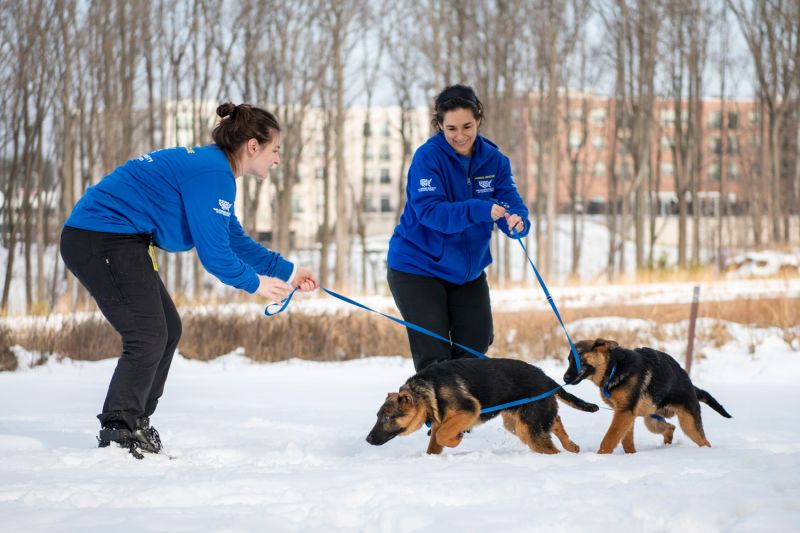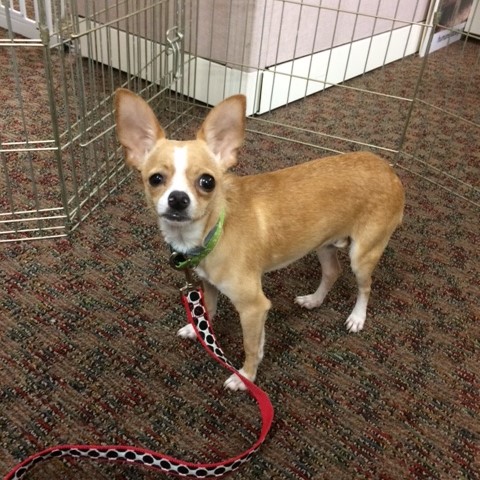Blog: Inside the fight against puppy mills
A longtime advocate shares her experience working to shut down mass-breeding operations
January 21, 2022

Whenever I go to my best friend’s house, I have to steer clear of Rhonda, a snappy Chihuahua with one droopy eye. Rhonda clearly doesn’t remember my role in bringing her to safety four years ago. She only knows that she’s finally found a secure and loving home, and she’ll guard it from anyone she views as an outsider.
I started working at Humane World for Animals almost 16 years ago, becoming their first staff member hired to focus full-time on shutting down puppy mills, and over the years I’ve met many dogs with stories like Rhonda’s. She isn’t from a shelter and has never lived on the streets. She’s a purebred Chihuahua who was sold in a high-end puppy store in New York City.
In fact, Rhonda wasn’t purchased just once but at least four times. The first time, she was shipped by truck across the country after the pet store purchased her from a notorious puppy mill in Kansas where she was born. The pet store sold Rhonda to a customer who later returned her due to her feisty personality. Then another customer bought and returned her.
Finally, in 2017, Rhonda was purchased as evidence in a Humane World for Animals undercover investigation. By then, the tiny dog was 6 months old and had spent most of her life in one small cage after another—at the breeder facility, on the broker truck and in the pet store. It was little wonder that she didn’t trust people.
Rhonda’s breeder is licensed by the U.S. Department of Agriculture, but Rhonda’s breeder is also a puppy mill, part of a network of family members in Kansas who frequently change their kennel names and license numbers. They’ve had numerous violations for sick dogs, filthy conditions and unsafe housing, and one of the family members even lost her license after her husband admitted shooting 24 dogs they no longer wanted. Rhonda was one of hundreds of puppies sold by the “family business” to pet stores all over the country, including many in New York.
When Humane World for Animals investigated Chelsea Kennel Club, a Manhattan pet store, in 2017, our undercover staffer noticed Rhonda’s temperament issues and the fact that her returns to the store for these issues weren’t being disclosed to potential customers. Humane World purchased Rhonda and another sick puppy as evidence.
The paperwork and video evidence were later turned over to local authorities, along with footage and log notes that showed animal mistreatment, customer deception and sick puppies at the store who weren’t receiving adequate care. The store closed soon after the exposé, and a court later fined its former owner about $4 million for knowingly selling sick puppy mill puppies.

Before I joined Humane World for Animals, I worked at a Maryland veterinary clinic, where I had noticed a trend. A few local breeders brought their newborn puppies to our veterinarian for first-class care; these breeders were committed to rearing healthy and well-adjusted pups. But not all of our clients were selecting pets from quality breeders.
Some were bringing in puppies they’d bought at pet stores or online, and their puppies were often extremely sick. One client had purchased a tiny toy breed puppy online who had multiple congenital disorders. They brought him in again and again to try to save his life, but he didn’t make it. Another family had purchased a “mini golden doodle” who was fit and healthy, but unpredictably aggressive.
Most of my previous dog experience involved working with shelters and rescues, including serving on the board of directors of a nonprofit rescue. I also fostered many dogs, and I knew shelter dogs sometimes had a reputation for behavior problems.
But the ones I was seeing at the veterinary clinic weren’t shelter dogs or pets saved from abusive homes. In fact, it seemed that some of our sickest and most unpredictable patients were purebred dogs whose owners had spent a lot of money to acquire them. I began to read more and more about puppy mills, and I became eager to apply my knowledge and energy to a national organization with the power to take on this insidious industry.
In my early years at Humane World, I worked on a variety of tasks, including starting a database of puppy buyer complaints, building a research base and creating public education campaigns. I also participated in some of our puppy mill rescues and pet store investigations. It didn’t take long for me to realize that puppy-selling pet stores like the one Rhonda came from were more the norm than the exception.
One of the first complaints I handled was from a woman in New York whose husband had given her what he thought was a wonderful holiday gift—a fluffy little puppy. Invisible to the naked eye was the canine virus the puppy had been exposed to in the pet store. Within weeks, he was dead. His grieving owner sent me a photo of the puppy, which I taped on my cubicle wall. That puppy was one of the first cases I entered in the new database.
It seemed that some of our sickest and most unpredictable patients were purebred dogs whose owners had spent a lot of money to acquire them.
Nearly 16 years later, I still keep tabs on the pet store he came from. Unfortunately, it’s still open. But its days may be numbered as we’re working hard to pass legislation that would permanently ban the sale of puppies in all New York pet stores. The Puppy Mill Pipeline Act passed the New York Senate in 2021, and in 2022 we’ll pick up where we left off in the Assembly. We’re halfway there!
In December 2021, we released an undercover investigation of another pet store in New York City, American Kennels. The conditions reminded me of the store Rhonda came from—sick puppies received ad hoc, insufficient care, and some stayed in the store’s basement for a long time because they were too sick to sell. Shortly after we released our footage, city authorities removed seven puppies from the store, one of whom I fostered over the holidays until she found her permanent home. At press time, it appears the store is in the process of losing its license and may be closing soon. So the work continues.
A lot has changed since 2006. Humane World's Stop Puppy Mills team now has eight full-time staff. Over the years, we’ve helped shut down some of the largest puppy mills and worst puppy stores in the country, spearheaded new laws in several states that limit the size of commercial breeding operations or require commercial breeders to be licensed and inspected, and helped conduct numerous pet store investigations. We’ve successfully pressured the USDA to pass new rules to better regulate breeders, including those that sell online, and to send the worst puppy mills for enforcement action, leading many of them to close. We’ve also helped pass five state laws that ban the sale of puppies in pet stores (you’re next, New York!), plus similar ordinances in more than 400 cities and towns.
The fight against puppy mills requires a multipronged approach and the collective efforts of dog lovers across the nation. Whether you have significant amounts of time to devote to the cause, or just an hour or two, I encourage you to download the Humane World's An Advocates Guide to Stopping Puppy Mills to learn how you can make a difference.
We won’t be stopping our investigations, our public education efforts or our legislative work until puppy mills are a thing of the past. Yes, sometimes the work is hard, and we don’t always win. Sometimes authorities shut down a puppy mill only to allow the breeder to sell off the dogs at auction (where they’re typically purchased by other commercial dealers), rather than sending them to shelters and rescues. Sometimes, as with New York, bills don’t pass the first time, and we have to try again and again. On tough days, it’s nice to remind myself that we’ve made a difference for thousands of dogs like Rhonda.
Sure, if Rhonda had her way, she would rather give me a “tooth squeeze” than sit in my lap. But that’s OK. My friend loves Rhonda dearly. As we continue to expose pet stores like Rhonda’s that buy from puppy mills, we’ll make sure fewer and fewer dogs have such a rough start in life.

